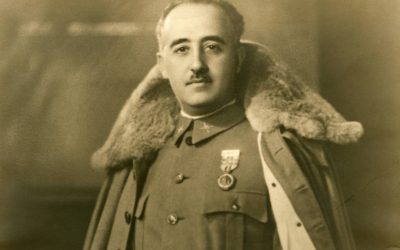Francisco Franco Bahamonde (1892–1975) was a Spanish military leader and dictator who ruled Spain from 1939 until he died in 1975. Born in El Ferrol, Galicia, into a naval family, Franco’s upbringing was characterised by strict discipline and traditional values. At age 14, he entered the Infantry Academy in Toledo, beginning a lifelong military career. Franco rapidly ascended the ranks, distinguishing himself through bravery and strategic acumen in Spain’s colonial wars in Morocco, earning him recognition as one of Spain’s youngest generals by age 33.
Rise to power
Franco’s rise to power began amid political instability in Spain during the Second Spanish Republic (1931–1939). In 1936, he became a central figure in the military revolt against the democratically elected Republican government, initiating the Spanish Civil War (1936–1939). His leadership unified various conservative, monarchist, and fascist groups under a nationalist banner, enabling him to consolidate power. Franco’s Nationalist forces benefited significantly from military assistance provided by Adolf Hitler’s Nazi Germany and Benito Mussolini’s Fascist Italy, receiving weapons, aircraft, and logistical support crucial to their eventual victory.
Dictatorship and human rights abuses
As leader of the Nationalist forces, Franco orchestrated military campaigns marked by harsh tactics, including severe repression of opposition, summary executions, and mass imprisonments. After the war, he established an authoritarian regime that promoted nationalism, Catholic conservatism, and strict societal control, severely repressing political dissent.
Human rights abuses under Franco’s regime included widespread censorship, imprisonment without a fair trial, forced labour, torture, and suppression of regional identities and languages, notably Catalan and Basque. Tens of thousands of political opponents disappeared or were executed, and many others endured persecution or exile.
Neutrality during World War II
Franco’s neutrality during World War II was pragmatic. Despite ideological sympathies with the Axis powers who had supported him during the Spanish Civil War, Franco recognised Spain’s weakened economy and military exhaustion post-civil war. Neutrality allowed him to maintain diplomatic relationships with both Axis and Allied powers, ensuring the survival of his regime and avoiding further devastation.
While he assisted Axis powers minimally, notably allowing German submarines to refuel in Spanish ports and providing strategic resources, Franco carefully avoided full involvement, especially as Axis defeat became apparent.
Death and legacy
His death in 1975 initiated Spain’s peaceful transition to democracy and carefully managed to avoid further civil conflict. Nevertheless, Franco’s legacy remains controversial, with heated debate over his authoritarian policies and human rights abuses.






Leave a Reply